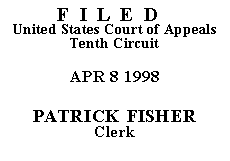

ALFONSO ALBERT LOPEZ,
Petitioner - Appellant,
v. No. 96-6384
PETER A. DOUGLAS; ATTORNEY
GENERAL OF THE STATE OF
OKLAHOMA,
Respondents - Appellees.
Submitted on the briefs:(1)
Alfonso A. Lopez, pro se.
In 1981, Petitioner pled guilty in state court to murder in the first degree and was sentenced to life imprisonment. He also pled guilty to shooting with intent to kill and was sentenced to a twenty-five year term to run consecutively to the life imprisonment sentence. He did not move to withdraw his pleas or file direct appeals.
In August 1986, he filed his first 28 U.S.C. § 2254 petition, contending that he received ineffective assistance of counsel and that his guilty pleas were involuntary. The petition was denied on the merits. This court denied issuance of a certificate of probable cause and dismissed the appeal. Lopez v. Douglas, No. 87-2004 (10th Cir. Mar. 17, 1988) (unpublished).
In June 1996, he filed a motion under Fed. R. Civ. P. 60(b)(6) to vacate the judgment denying his first § 2254. He contended in relevant part that the decision in Cooper v. Oklahoma, 116 S.Ct. 1373 (1996), affected the district court's determination of his prior ineffective assistance of counsel claim because he was "prejudiced by his counsel's failure to request a pre-plea competency determination." Id. at 1-2. The district court adopted the magistrate judge's supplemental findings and recommendation and denied the motion. Petitioner appeals.
The Rule 60(b)(6) motion filed by Petitioner Lopez in June 1996 was a second habeas petition under the Antiterrorism and Effective Death Penalty Act of 1996 ("AEDPA"). See Burris v. Parke, 130 F.3d 782, 783 (7th Cir. 1997). "Rule 60(b) cannot be used to circumvent restraints on successive habeas petitions." Felker v. Turpin, 101 F.3d 657, 661 (11th Cir.), cert. denied, 117 S.Ct. 451 (1996). Moreover, "the successive petition restrictions contained in the amendments to [28 U.S.C.] § 2244(b) apply to Rule 60(b) proceedings, even where those proceedings seek to amend a judgment that became final before the effective date of the amendments." Id.
Since Petitioner filed his second § 2254 petition after April 24, 1996, the effective date of the AEDPA, he was required to comply with the Act's relevant provisions and obtain prior authorization from this court before filing in the district court. He failed to obtain this authorization. Therefore, the district court lacked jurisdiction to decide his unauthorized second petition, and this court must vacate the district court order. See United States v. Avila-Avila, 132 F.3d 134, 1348-49 (10th Cir. 1997).
However, we will construe Petitioner's notice of appeal and appellate brief as an implied application under 28 U.S.C. § 2244(b)(3)(A) for leave to file a second habeas petition in the district court. See Pease v. Klinger, 115 F.3d 763, 764 (10th Cir. 1997).
In his implied application, he argues that the decision in Cooper constituted an intervening change of law, which "affects the district court's . . . denial of his claim of ineffective assistance of counsel" raised in his first § 2254. Id. at 5.
We have thoroughly reviewed the implied application and conclude Petitioner Lopez has failed to make a prima facie showing that satisfies AEDPA's criteria for the filing of a second habeas petition. See 28 U.S.C. § 2244(b)(3)(C). His claim does not rely on a new rule of constitutional law made retroactive to cases on collateral review by the Supreme Court that was previously unavailable, § 2244(b)(2)(A). In Cooper, the Supreme Court explained at great length how years of case and statutory law supported its holding. 116 S.Ct. at 1377-80. Thus, the decision did not create a new rule of law. See Hatch v. State of Okl., 92 F.3d 1012, 1016 n. 3 (10th Cir. 1996).
Accordingly, the district court's October 31, 1996 Order disposing of Petitioner's unauthorized second § 2254 petition is VACATED, and the implied application for leave to file a second petition in the district court is DENIED.
1. After examining the brief filed by Alfonso A. Lopez and the appellate record, this panel has determined unanimously that oral argument would not materially assist the determination of this appeal. See Fed. R. App. P. 34(a); 10th Cir. R. 34.1.9. The case is submitted without oral argument.